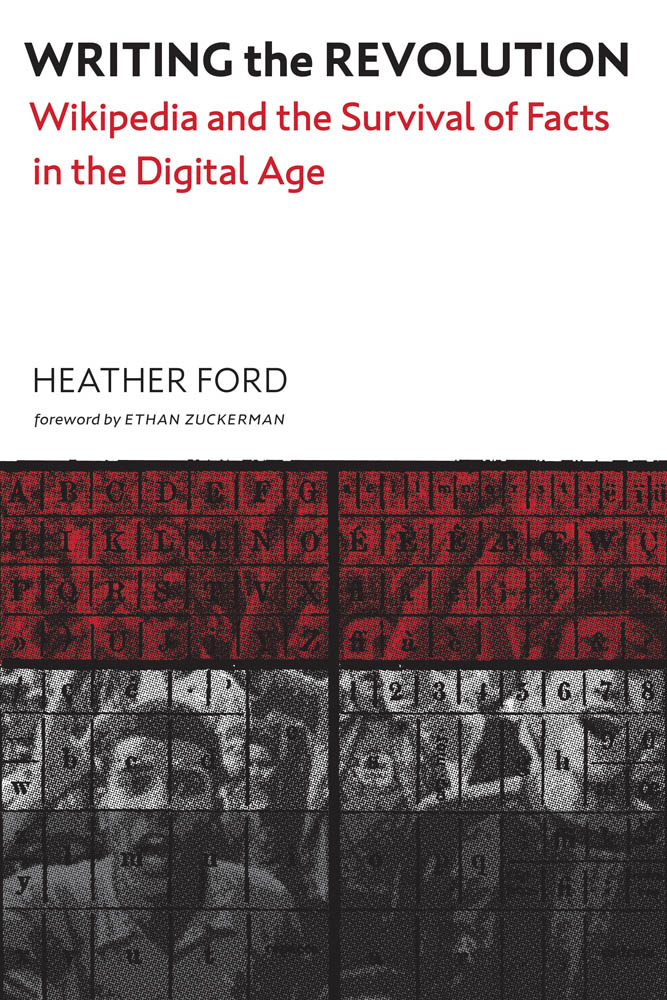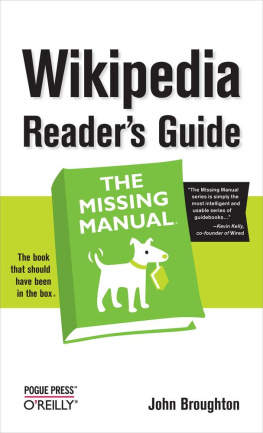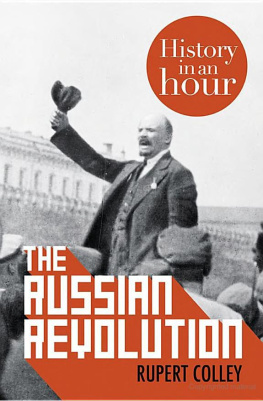Contents
List of Figures
Guide
Pagebreaks of the print version

WRITING THE REVOLUTION
WIKIPEDIA AND THE SURVIVAL OF FACTS IN THE DIGITAL AGE
HEATHER FORD
FOREWORD BY ETHAN ZUCKERMAN
THE MIT PRESSCAMBRIDGE, MASSACHUSETTSLONDON, ENGLAND
2022 Massachusetts Institute of Technology
All rights reserved. No part of this book may be reproduced in any form by any electronic or mechanical means (including photocopying, recording, or information storage and retrieval) without permission in writing from the publisher.
The MIT Press would like to thank the anonymous peer reviewers who provided comments on drafts of this book. The generous work of academic experts is essential for establishing the authority and quality of our publications. We acknowledge with gratitude the contributions of these otherwise uncredited readers.
Library of Congress Cataloging-in-Publication Data
Names: Ford, Heather, author.
Title: Writing the revolution : Wikipedia and the survival of facts in the digital age / Heather Ford ; foreword by Ethan Zuckerman.
Description: Cambridge, Massachusetts : The MIT Press, [2022] | Includes bibliographical references and index.
Identifiers: LCCN 2021058945 | ISBN 9780262046299 (paperback)
Subjects: LCSH: Wikipedia. | EgyptHistoryProtests, 20112013Miscellanea. | WikipediaAuthorship. | Truthfulness and falsehood. | Semantic Web. | Google (Firm)Influence. | Electronic encyclopediasCross-cultural studies. | Knowledge, Sociology ofCase studies.
Classification: LCC AE100 .F67 2022 | DDC 030dc23/eng/20220207
LC record available at https://lccn.loc.gov/2021058945
d_r0
For Luigi and Salvatore, per sempre
CONTENTS
LIST OF ILLUSTRATIONS
- Screenshot of Putin result in Russian Google, January 14, 2018 (from Global Voices, January 16, 2018).
- Screenshot of Google search results for Who is Vladimir Putin?, September 2021.
- Digital facts.
- Digital facts and their containers.
- Digital facts and their allies and companions.
- Khaled Mohamed Saeed holding up a tiny, flailing, stone-faced Hosni Mubarak, by Carlos Latuff.
- Timeline of significant changes to English Wikipedia 48 hours after Hosni Mubaraks resignation on February 11, 2011
FOREWORD
In March 2018, YouTubes CEO Susan Wojcicki announced that the video-sharing behemoth would begin adding excerpts from Wikipedia articles to certain videos in order to provide context. Explaining that YouTube is not a news organization, Wojcicki told an audience at Austins South by Southwest Conference that the website would add these information cues to videos about controversial topics like chemtrails, the moon landing, and other subjects popular with conspiracy theorists. Rather than make challenging moderation decisions about removing this problematic content from the platform, the Wikipedia articles would ground a viewer in factual, encyclopedic reality.
In other words, YouTube decided to outsource the problem of determining whats true to Wikipedia, the webs most fascinatingand misunderstoodproject.
From YouTubes point of view, this is an inspired move. Moderation is expensive, time-consuming, controversial, and only becoming more difficult to do. Determining whats true in a world that seems divided into not just rival ideological camps but rival epistemologies is a losing proposition for a business that just wants to market advertising to its two billion monthly users. Why pick a fight over the truth in Donald Trumps America, where only two years later the president would deny the existence of a global pandemic and his supporters would declare that the election that removed him from power was fraudulent?
Being held up as a noncontroversial source of truth represented a remarkable turn for Wikipedia. Ten years earlier, pundits debated whether an encyclopedia written by pseudonymous nonexperts should ever be taken seriously. Schoolteachers warned students against citing Wikipedia directly. Now one of the worlds most powerful companies was admitting that, in a contentious world, Wikipedia is likely the closest we will ever get to consensus reality.
But how does Wikipedia determine what consensus reality is? And is the method of achieving consensus mysterious and technical, or is it rooted in traditional questions of influence and power?
Using one of the most remarkable factual events of the new millenniumthe Egyptian revolution of 2011as its central narrative, this remarkable book unpacks the complex and nuanced question of how Wikipedians decide what constitutes a fact. Through interviews with Wikipedians and a careful reading of the talk pages and editing records, Heather Ford offers a surprising narrative in which Wikipedia is not just a passive observer but an active player in determining our understanding of the Arab Spring.
Fords exposition centers on the story of a single Wikipedian, whose contribution to overthrowing Mubarak was as simple and as profound as framing the events that began on January 25, 2011, as a revolution rather than a demonstration, a riot, or an uprising. Fords careful reading of Wikipedia records shows that The Egyptian Liberal, the creator of the 2011 Egyptian Protests Wikipedia entry, was active in framing the events in Tahrir Square as a popular uprising, a movement that was underway, an event that could lead to a revolution. Through careful crafting of an article and its metadataand the shepherding of citations, the ammunition for policy battles on WikipediaThe Egyptian Liberal frames the events unfolding in Tahrir Square as a continuation of the events a few weeks earlier in Tunisia, an uprising spreading through the region. Ford shows that this framing precedes the global medias understanding of what unfolds in Tahrir Square and helps certify the Egyptian revolution as fact.
Ford describes the process of The Egyptian Liberal and the thousands of other Wikipedians who contribute to the article in the tumultuous weeks after January 25 as the stabilization of facts. It is this complex, technical, and political work that shapes knowledge both on Wikipedia and in the broader world, as the facts set down in Wikipedia become Siris and Alexas answers to questions asked of our voice-activated devices, or the information delivered at the top of Google search results. Given Wikipedias power for stabilizing facts and propagating them throughout the world, it is critical that we understand the processes through which events become fact.
Wikipediansincluding Wikipedias cofounder Jimmy Walescan express a belief in the communitys process, which seems as much rooted in faith as in fact. Somehow the collective action of many people contributing to a single work, unified around the communitys core values of a neutral point of view, verifiability, and no original research, allows the convergence of a stable reality in an unstable and disputed world. Ford shatters this faith-based version of Wikipedia with the story of the Egyptian revolution article, written by a partisan to ensure a particular political framing of events was the version of the world that stabilized as fact.
Shattering the magic of the Wikipedia process has other implications. Faced with criticism of Wikipedias flaws, including an overrepresentation of men over women in its biography pages and a bias toward North American and Europe over Africa and Asia, defenders of the project offer the mirror theory, the idea that Wikipedia mirrors the inequities of knowledge production of the world as a whole. But that idea is untenable once you follow Fords exegesis. Knowledge on Wikipedia is not a reflection and distillation of knowledge available in the world, assembled by neutral actors. Its a painstaking and technical process in which Wikipedians use their understanding of the communitys tools and procedures to advocate for the importance of some events over others, for preferred framings to become factual understandings that propagate throughout the world.








![Conor Lastowka - [Citation Needed]: The Best of Wikipedias Worst Writing](/uploads/posts/book/53705/thumbs/conor-lastowka-citation-needed-the-best-of.jpg)
